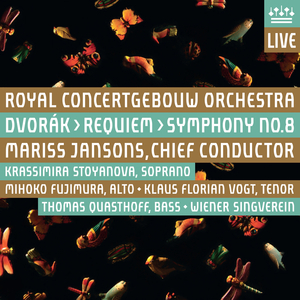Dvorák Requiem; Symphony No 8
Superb performances and magnificent recordings of sacred work and symphony
View record and artist detailsRecord and Artist Details
Composer or Director: Antonín Dvořák
Genre:
Vocal
Label: RCO Live
Magazine Review Date: 7/2010
Media Format: Super Audio CD
Media Runtime: 0
Mastering:
Stereo
DDD
Catalogue Number: RCO10001

Tracks:
| Composition | Artist Credit |
|---|---|
| Requiem Mass |
Antonín Dvořák, Composer
(Royal) Concertgebouw Orchestra, Amsterdam Antonín Dvořák, Composer Klaus Florian Vogt, Tenor Krassimira Stoyanova, Soprano Mariss Jansons, Conductor Mihoko Fujimura, Alto Thomas Quasthoff, Bass Vienna Singverein |
| Symphony No. 8 |
Antonín Dvořák, Composer
(Royal) Concertgebouw Orchestra, Amsterdam Antonín Dvořák, Composer Mariss Jansons, Conductor |
Author: Rob Cowan
The “Dies irae” is grimly insistent and the Parsifal-like use of brass and tam-tam at the start of the “Tuba mirum” is supremely effective, though the lyrical “Recordare” is very characteristic. The work’s second part, which starts with the Offertorium, offers the greater comfort and generally lighter shades, the thundering central climax of the closing “Agnus Dei” (disc 2, tr 3, from 5'49") quite overwhelming on this magnificent recording, a credible rival to Ancerl (DG), Kertész (Decca) and most particularly Armin Jordan (Warner). The singing is consistently fine, both solo and in ensemble, and the sheer range of colour achieved by the Vienna Singverein, whether in rapt pianissimo or when singing their hearts out in the “Agnus Dei”, at times defies belief.
The most recent rival to Jansons – with Neeme Järvi conducting the London Philharmonic’s forces in full cry, and recorded at almost exactly the same time – was much praised in these pages, and with good reason (1/10). It’s a fair bit swifter than this Jansons version, though that exultant last climax makes less of an impact, principally because an important counter-idea at its crown is partially obscured. Also, there’s some less-than-tight string ensemble early on in the “Dies irae”. The fill-up on the present double-pack (Järvi’s set doesn’t have one) is a “very Mariss Jansons” performance of the Eighth Symphony that toys with dynamics in pursuit of maximum expressive effect, especially in the first movement, and after the Allegretto grazioso’s Trio, the hushed return on the strings of the principal theme.
I like Jansons’s capricious handling of those chirpy woodwind figurations in the Adagio and although at times “character” stoops to mannerism, it’s a real performance and a worthy makeweight for a magnificent reading of the Requiem, which is a real feather in Jansons’s cap, CD-wise. Both recordings are superb.
Explore the world’s largest classical music catalogue on Apple Music Classical.
Included with an Apple Music subscription. Download now.

Gramophone Digital Club
- Digital Edition
- Digital Archive
- Reviews Database
- Events & Offers
From £9.20 / month
Subscribe
Gramophone Club
- Print Edition
- Digital Edition
- Digital Archive
- Reviews Database
- Events & Offers
From £11.45 / month
Subscribe
If you are a library, university or other organisation that would be interested in an institutional subscription to Gramophone please click here for further information.






